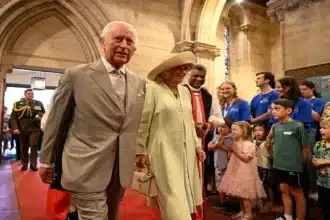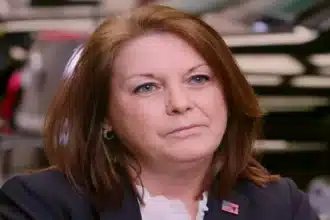The report of over 400 people being detained in Russia amid tributes to the opposition leader Alexei Navalny marks a significant and somber event. Navalny, aged 47, died unexpectedly at a remote Arctic penal colony, leaving a profound impact not only within Russia but globally. Navalny was widely recognized as President Vladimir Putin’s most formidable opponent, consistently vocal in his criticism of the Kremlin despite the personal risks, including surviving a nerve agent poisoning and facing multiple prison sentences.
The announcement of his death has sparked widespread reactions, leading hundreds of people across dozens of Russian cities to create ad-hoc memorials. They brought flowers and candles to monuments dedicated to victims of political repressions, in a gesture of homage to Navalny’s life and work. However, these acts of remembrance were met with a strong response from the authorities, with the OVD-Info rights group reporting that police detained 401 individuals by Saturday night in over a dozen cities. St. Petersburg, Russia’s second-largest city, saw more than 200 arrests, highlighting the government’s stringent crackdown on these gatherings.
Among those detained was Grigory Mikhnov-Voitenko, a priest from the Apostolic Orthodox Church, who had announced a memorial service for Navalny on social media. Arrested on Saturday morning, Mikhnov-Voitenko was charged with organizing a rally and later hospitalized after suffering a stroke, underscoring the severe consequences faced by those who publicly mourn Navalny.
The response to the gatherings and the subsequent arrests has been varied, with court officials in St. Petersburg ordering detentions ranging from one to six days in jail for 42 individuals, alongside fines for others. Similarly, in Moscow, at least six people were sentenced to 15 days in jail, with additional detentions reported in Krasnodar and Bryansk.
Also Read: California Braces for Double Deluge: Two Atmospheric Rivers Set to Soak State with Heavy Rainfall
The circumstances surrounding Navalny’s death remain shrouded in mystery, with his team and supporters accusing the authorities of foul play. The cause of death was ambiguously attributed to “sudden death syndrome,” a term that has done little to quell speculation and concern. The delay and obfuscation in releasing Navalny’s body to his family have only intensified these suspicions, with his mother and lawyers facing bureaucratic hurdles and conflicting information in their efforts to retrieve his remains.
The lack of transparency is further highlighted by the absence of video evidence from the penal colony, despite the extensive surveillance Navalny was subjected to during his imprisonment. This absence of information has fueled demands for accountability and truth regarding the circumstances of Navalny’s death.
Navalny’s death comes at a critical juncture, just a month before a presidential election in Russia, which is expected to extend President Putin’s tenure. This event not only represents a tragic loss for Navalny’s family and supporters but also signifies a pivotal moment in Russian politics, raising serious questions about the state of political freedoms and the future of opposition in the country.
Also Read: Breaking News: Safety Concerns Rise as Student Injured in Knife Incident at Brighton High School




